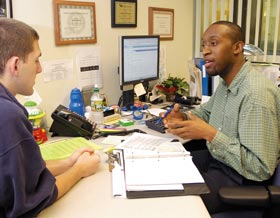For more archives, go to the Advance Archive/Search Page.
ACES Advisers Help Students Navigate Academic Choices
 |
Adrian McCleary, an ACES advisor, right, meets with Michael Pitcher, a sophomore. ACES helps students who are undecided about their major explore their options. |
Photo by Melissa Arbo |
Anyone who has ever visited a major art or science museum has some sense of what it’s like to choose a major at UConn. A world-class museum offers endless corridors to explore, all of them enticing in their own way, and so does UConn. Fortunately, museum visitors need not look far for help, and neither do students who are unsure of what course to chart at UConn.
To help students navigate the bewildering array of more than 100 majors and, by extension, potential career choices, the Advising Center for Exploratory Students (ACES) counsels thousands of undecided students every year. The process helps students choose a major ,while also learning something about themselves by asking honest questions and engaging in volunteer activities and internships.
ACES serves two types of students, says Steve Jarvi, assistant vice provost and director of ACES. “Exploratory” students are those who are truly undecided about a major. The second group includes students who are planning to transition to a major in one of UConn’s schools and colleges. This group includes “pre” majors who intend to apply to the Schools of Allied Health, Education, or Pharmacy in the spring semester of their sophomore year.
One of the first tasks at ACES is to show students that there is no stigma in being undecided, says Kimeta Straker, an assistant director. In fact, she says, students often switch majors more than once as their interests shift.
“Students who already have a major sometimes see exploratory students as not being serious about school, or as having limited options,” Straker says. “But that’s a myth. Their options are boundless.”
At a recent workshop for undecided students, Straker posed basic questions such as, “What’s the definition of undecided?” Various answers were offered: in doubt, unsure, unresolved, unclear, vague, ambivalent. If those responses seem to have a negative tinge, consider the upbeat contrasting terms the same students associated with “exploratory”: investigating, searching, examining, discovering.
To help students on their voyage of discovery, ACES emphasizes face-to-face advising, and students continue to see the same advisor they start with, Jarvi says.
“As ACES became more popular since it began in 1998, we experimented briefly with group sessions and shorter appointments,” Jarvi says. “But students told us that they preferred longer individual appointments with their assigned advisors, so the University committed resources to expand the program.”
Advisors help keep students on track for timely graduation by counseling them about the number of courses they need to take each semester, and the options they have for catching up during the winter or summer break if they fall behind.
Advisors also encourage undecided students to keep their options open and meet broad general requirements, to ensure that when they make up their minds they have, as much as possible, the prerequisites they will need for their chosen major. And they urge students to explore the alternatives early, since a late switch may mean that a student has to take extra courses to fulfill the prerequisites for the new major.
Like many ACES students, Jack Delbridge changed direction after his ACES experience.
“I entered ACES in the Spring 2004 semester,” he says. “I was a physiology and neurobiology major, but ACES helped me realize I liked marketing and had some aptitude for it. ACES introduced me to a lot of other people who were in the same situation as I was. It built up my confidence.”
Delbridge says ACES helped launch him toward a career in public relations or advertising. The program encouraged him to job shadow a person who handles public relations for the insurance company AFLAC.
ACES also helped junior Daniel Marrero structure his courses to prepare him for medical school and a possible career in emergency medicine.
“I was unsettled, but ACES really helped get me on track with the right courses in biology, nutrition, and chemistry,” he says.
The average ACES advisor is a full-time professional staff member, has a caseload of nearly 400 students, and is available for 20 to 30-minute appointments as needed. Walk-ins are also welcome. To augment the personal sessions, requirements for majors and degrees are available online, along with an advisor’s notes about decisions made during meetings with students.
ACES also is the academic home of students who avail themselves of its services prior to choosing a major. It is responsible for such administrative and academic functions as late course withdrawals, excess credit authorizations, administrative grade changes, and academic probation and dismissal decisions.
The ACES advisors typically have advanced degrees but are comfortable advising students gravitating toward almost any field. All advisors teach at least one First-Year Experience course each year, designed to help new students adjust to college life and learning.
ACES exists primarily to help students settle successfully into majors, but the program also yields useful data about students. For example, students who started in ACES have graduated from every school and college at UConn, including at the regional campuses. Most ACES students will graduate with a major in the College of Liberal Arts and Sciences. There are slightly more female ACES students than male, mirroring the full-time undergraduate population at Storrs.
In the fall semester of 2003, 30 percent of the ACES students intended to pursue majors in allied health, education, and pharmacy, but less than half were expected to be admitted. Given that reality, ACES advisors help students develop alternative majors as early as possible in the advising process.

